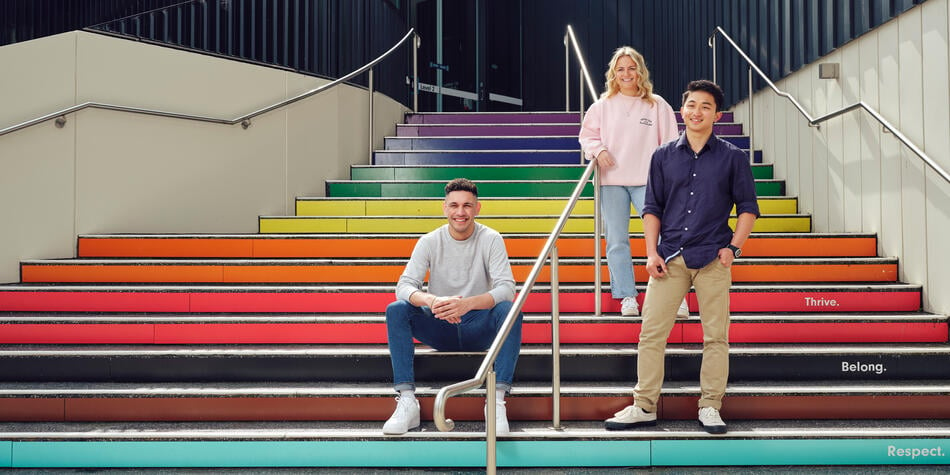Taking six, nine or even the full 12 months off is a rare chance to have some untethered adventures. Consider the skills, connections and knowledge about yourself you pick up along the way.
Gap year options
The options for making the most of a gap year are endless: for example, you could teach English in Nepal, take tango classes in Argentina, pull beers in an outback pub, do an internship in London, or volunteer at an animal sanctuary in Africa.
Deakin student Rochelle Guilbert opted for a two-month job at Camp America, followed by a month of travelling around the US. Then there was a nanny job in her hometown in Tasmania to bookend, and help pay for, the experience.
Rochelle, now 23, had initially been accepted into a nursing degree, but says her decision to take a year away from the classroom was a no-brainer.
‘I thought these opportunities probably don’t really come up that often,’ she says. ‘I also wasn’t really quite ready to start straight into uni, because I thought that’s at least three years I’m going to be committed for.’
She knew she wanted to travel as much as possible, and was inspired by some photos taken by a girl she knew who’d been to Camp America.
‘It just looked like such a fun place to be. I looked into it and I just thought, you know what, that’s exactly how I want to spend my gap year,’ Rochelle says.
Jet-setting off on your own adventure during your gap year, be it overseas or interstate, is a fantastic way to broaden your horizons and gain valuable life experience – things which can enhance your career in the future.
Having fun and making friends
Rochelle was accepted to a camp in April, and flew over in mid-June. ‘I was lucky enough to get placed on a camp three hours out of New York City, which was amazing.’
She was a camp counsellor, working with three others to look after a group of 12-year-old girls. An average day involved enjoying activities such as horse riding, waterskiing, or soccer with the camp-goers.
‘It was so much fun – they just became like my friends. They were really quite mature for their age.’
On days off, she and fellow staff would visit destinations such as Niagara Falls. After the camp was over, it was off to New York City. There, some camp connections really paid off when a new American pal offered to host Rochelle and a friend.
‘It turns out her dad owns a chain of hotels, and they lived on Fifth Avenue in the second apartment down from the penthouse,’ she says. ‘It was just a crazy experience.’
I also wasn’t really quite ready to start straight into uni, because I thought that’s at least three years I’m going to be committed for.
Rochelle Guilbert
Student, Deakin University
Gaining fresh perspectives
Can having this much fun actually help your future career? Yes, according to well-travelled Deakin graduate, Ben Campbell, who says a decent break allows you to gain some fresh perspectives.
The marketing strategist, who currently calls Norway’s capital, Oslo, home, didn’t take a gap year himself – at least not directly after high school.
‘I just took five months off and travelled and put my career on hold and I think people should do that every few years,’ says the 32-year-old. ‘You can’t fix things on the go. Sometimes you need to take a step away from everything and hit the reboot button.’
While Ben sees value in combining university study and travel, he believes a gap year can have its own benefits.
‘I think it’s incredibly unique to the person,’ he says. ‘If you’ve been in a boarding school for example, and you’ve never really lived much, then you should get the hell out and see something.’
Ben says a gap year is also an ideal opportunity to try your hand at various pursuits. ‘Unless mum and dad are funding you with a huge amount of cash, you’ve got to fail a few times to be anything.’
Discovering your real passion
For Rochelle, the experience ultimately inspired her to study primary school teaching.
But it took a while – and a short-lived detour to study psychology – for the penny to drop.
‘When I got to Camp America, the guy that owned the camp made this big speech about how 80% of counsellors that work at the camp end up changing their career path to education,’ she says.
‘I remember thinking “oh my God, that’s not going to be me, as if”. I kind of had that mentality the whole way through.
‘But much later, I thought “well hang on a minute, I went to Camp America, I was a nanny for two children and I had the best time all year in my gap year. Primary education is just a perfect fit for me”.’

